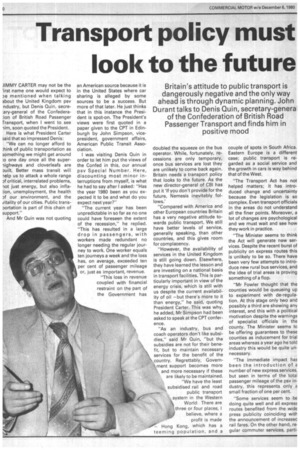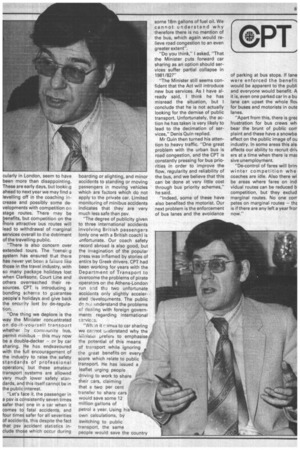Transport policy must look to the future
Page 82

Page 83

If you've noticed an error in this article please click here to report it so we can fix it.
Britain's attitude to public transport is dangerously negative and the only way ahead is through dynamic planning. John Durant talks to Denis Quin, secretary-genera of the Confederation of British Road Passenger Transport and finds him in positive mood
JIMMY CARTER may not be the 'irst name one would expect to De mentioned when talking 3bout the United Kingdom psv ndustry, but Denis Quin, secre:ary-general of the Confedera:ion of British Road Passenger Transport, when I went to see -Jim, soon quoted the President.
Here is what President Carter 3aid that so impressed Denis:
"We can no longer afford to :hink of public transportation as 3omething we might get around :o one day once all the superaighways and cloverleafs are Duilt. Better mass transit will ielp us to attack a whole range pf critical, interrelated problems, lot just energy, but also infla:ion, unemployment, the health pf our environment, and the vitality of our cities. Public trans3ortation is part of this chain of 51.1pport.
And Mr Quin was not quoting an American source because it is in the United States where car sharing is alleged by some sources to be a success. But more of that later. He just thinks that in this instance the President is spot-on. The President's views were first quoted in a paper given to the CPT in Edinburgh by John Simpson, vicepresident, government affairs, American Public Transit Association.
I was visiting Denis Quin in order to let him put the views of the Confed in this, our annual psv Special Number. Here, discounting most minor interruptions from myself, is what he had to say after I asked: "Has the year 1980 been as you expected it to be and what do you expect next year?"
"The current year has been unpredictable in so far as no one could have foreseen the extent of the recession," he replied. "This has resulted in a large drop in passengers, with workers made redundant no longer needing the regular journey to work. One worker equals ten journeys a week and the loss has, on average, exceeded ten per cent of passenger mileage or, just as important, revenue.
"This loss in revenue coupled with financial restraint on the part of the Government has doubled the squeeze on the bus operator. While, fortunately, recessions are only temporary, once bus services are lost they are unlikely to come back again. Britain needs a transport policy that looks to the future. As the new director-general of CBI has put it 'If you don't provide for the future, Nemesis inevitably follows.'
"Compared with America and other European countries Britain has a very negative attitude towards public transport. We still have better levels of service, generally speaking, than other countries, and this gives room for complacency.
"However, the availability of services in the United Kingdom is still going down. Elsewhere, they have learned the lesson and are investing on a national basis in transport facilities. This is particularly important in view of the energy crisis, which is still with us despite the current availability of oil —but there's more to it than energy," he said, quoting President Carter. This was why, he added, Mr Simpson had been asked to speak at the CPT conference.
"As an industry, bus and coach operators don't like subsidies," said Mr Quin, "but the subsidies are not for their benefit, but to maintain necessary services for the benefit of the country. Regrettably, Govern' rnent support becomes more and more necessary if these are likely to be maintained.
"We have the least subsidised rail and road public transport system in the Western World There are three or four places, I believe, where a profit is made Hong Kong, which has a teeming population, and a couple of spots in South Africa. Eastern Europe is a different case; public transport is regarded as a social service and the growth in cars is way behind that of the West.
"The Transport Act has not helped matters; it has introduced change and uncertainty because the legislation is so complex. Even transport officials in the areas do not understand all the finer points. Moreover, a lot of changes are psychological and we must wait and see how they work in practice.
"The Minister seems to think the Act will generate new services. Despite the recent burst of publicity on express routes this is unlikely to be so. There have been very few attempts to introduce new rural bus services, and the idea of trial areas is proving something of a flop.
"Mr Fowler thought that the counties would be queueing up to experiment with de-regulation. At this stage only two and possibly a third are showing any interest, and this with a political motivation despite the warnings of specialist officials in the county. The Minister seems to be offering guarantees to these counties as inducement for trial areas whereas a year ago he told industry this would be quite unnecessary.
"The immediate impact has been the introduction of a number of new express services, but seen in terms of the total passenger mileage of the psv in dustry, this represents only a small fraction of one per cent.
"Some services seem to be doing quite well and all express routes benefited from the wide press publicity coinciding with the announcement of increasec rail fares. On the other hand, re. gular commuter services, peril cularly in London, seem to have been more than disappointing. These are early days, but looking ahead to next year we may find a levelling off in the coaching increase and possibly some developments with competition (Do stage routes. There may be benefits, but competition on the more attractive bus routes will lead to withdrawal of marginal services overall to the detriment of the travelling public.
"There is also concern over extended tours. The lcensir.g system has ensured that thee has never yet been a falluie like those in the travel industry, with so many package holidays lost when Clarksons, Court Line and others overreached their resources. CPT is introducing a bonding scheme to guarantee people's holidays arid give back the security lost by de-regulation.
"One thing we deplore is the way the Minister concentrated on do-it-yourselr transport whether by conicounity bus, permit minibus — this rney now be a double-decker — or by car sharing. He has endeavoured with the full encouragement of the industry to raise the safety standards of professional operators, but these amateur transport systems are allowed very much lower safety standards, and this itself cannot be in the public interest.
"Let's face it, the passenger in a psv is consistently seven times safer than one in a car when it comes to fatal accidents, and four times safer for all severities of accidents, this despite the fact that psv accident statistics include those which occur during boarding or alighting, and minor accidents to standing or moving passengers in moving vehicles which are factors which do not apply to the private car. Limited monitoring of minibus accidents indicates that they are very much less safe than psv.
"The degree of publicity given to three international accidents involving British passengers (only one with a British coach) is unfortunate. Our coach safety record abroad is also good, but the imagination of the popular press was inflamed by stories of antics by Greek drivers. CPT had been working for years with the Department of Transport to overcome the problems of pirate operators on the Athens-London run and the two unfortunate accidents only slightly accelerated developments. The public do nuk understand the problems of dealing with foreign governments regarding international s.e :vice s.
"Wh.-:n it cemes to car sharing we cannot uaderstand why the ivlinistei prefers to emphasise the potential of this means of transport while ignoring the great benefits on every' score which relate to public transport. He has issued a leaflet urging people driving to work to share their cars, claiming that a two per cent transfer to share cars would save some 12 million gallons of petrol a year. Using his own calculations, by switching to public transport, the same people would save the country
some 18m gallons of fuel oil. We cannot understand why therefore there is no mention of the bus, which again would relieve road congestion to an even greater extent".
"Do you think," I asked, "That the Minister puts forward car sharing as an option should services suffer partial collapse in 1981/82?"
"The Minister still seems confident that the Act will introduce new bus services. As I have already said, I think he has misread the situation, but I conclude that he is not actually looking for the demise of public transport. Unfortunately, the action he has taken is very likely to lead to the decimation of services," Denis Quin replied.
Mr Quin then turned his attention to heavy traffic. "One great problem with the urban bus is road congestion, and the CPT is constantly pressing for bus priorities in order to improve the flow, regularity and reliability of the bus, and we believe that this can be done at very little cost through bus priority schemes," he said.
"Indeed, some of these have also benefited the motorist. Our next problem is the enforcement of bus lanes and the avoidance of parking at bus stops. If lane were enforced the benefit would be apparent to the publi and everyone would benefit. A it is, even one parked car in a bu lane can upset the whole flm for buses and motorists in oute lanes.
"Apart from this, there is grez frustration for bus crews wh, bear the brunt of public corr plaint and these have a snowba effect on the public image of ou industry. In some areas this als, affects our ability to recruit driN, ers at a time when there is mat sive unemployment.
"De-control of fares will brim winter competition whe coaches are idle. Also there wi be areas where fares on ind vidual routes can be reduced b competition, but they exclud marginal routes. No one corr petes on marginal routes — thee is if there are any left a year fror now."












































































































































